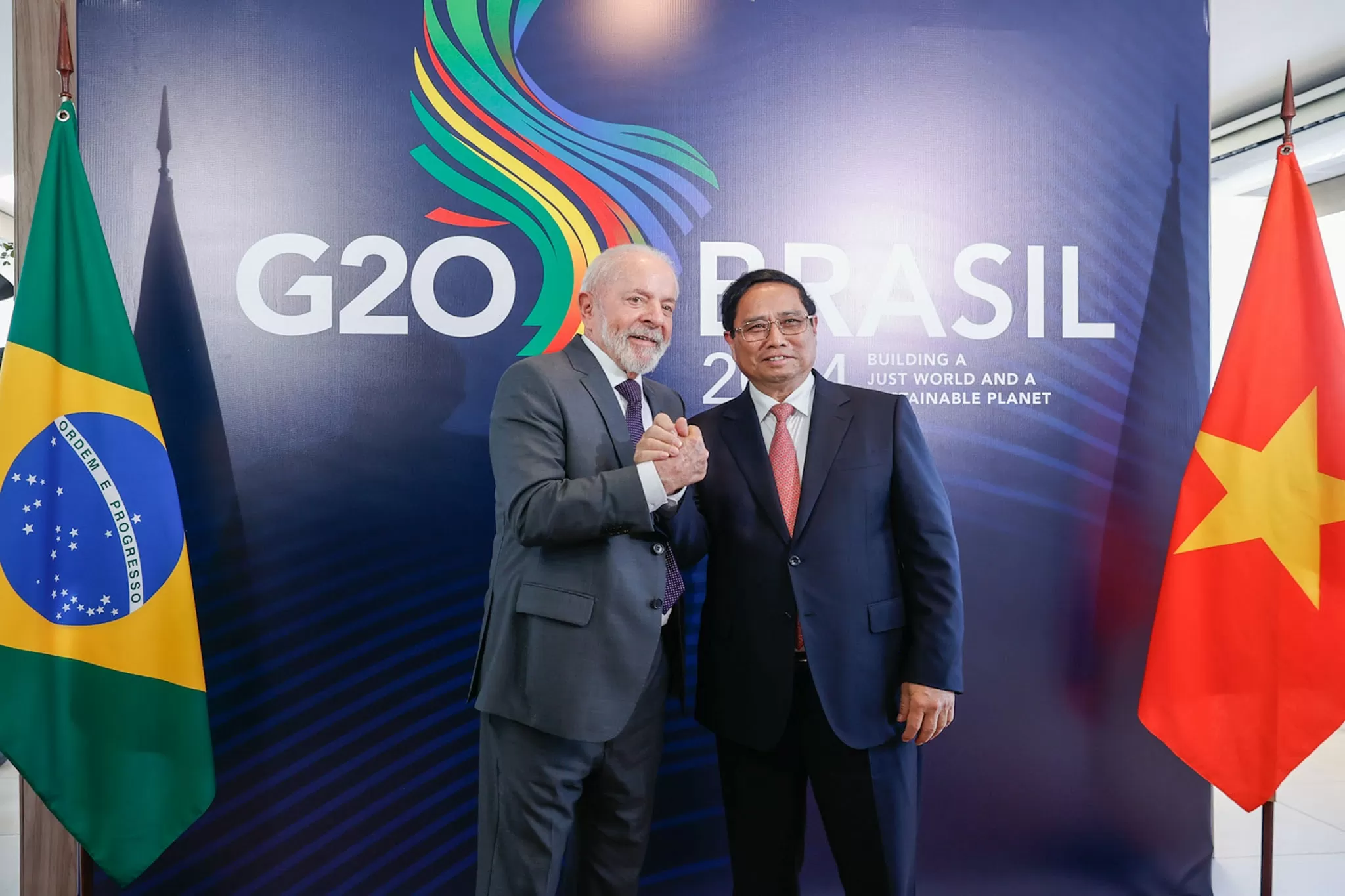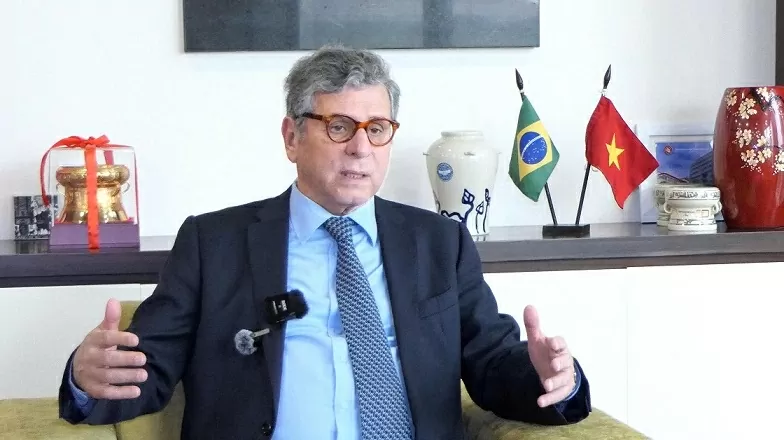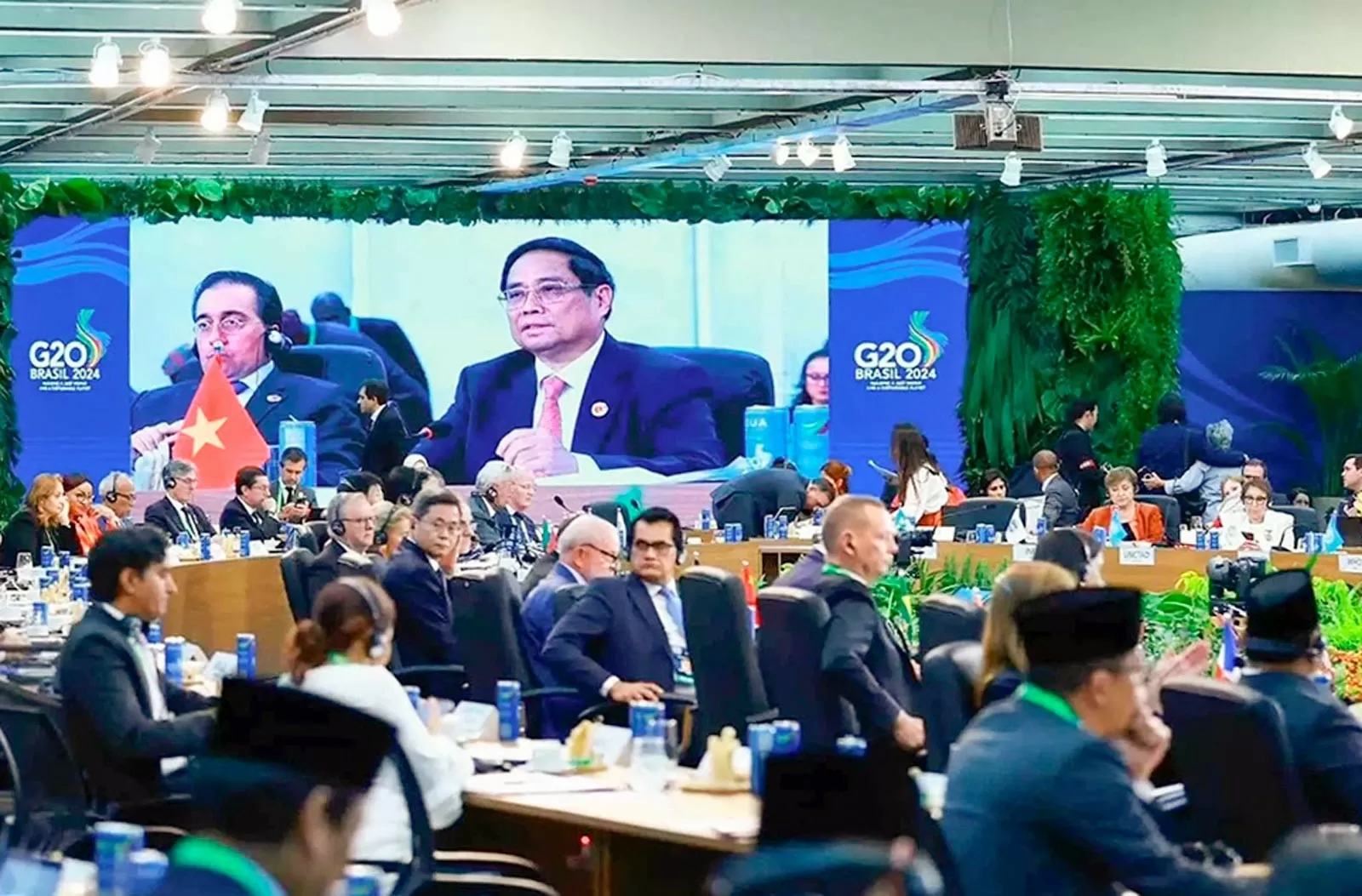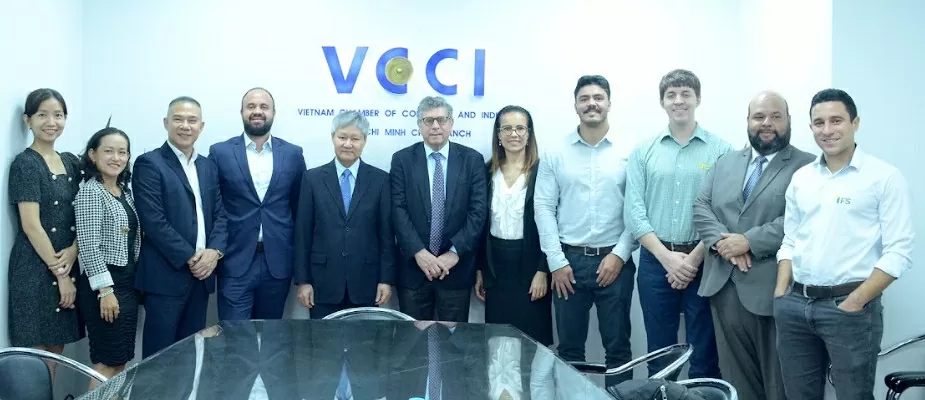
Brazilian President's State visit to Vietnam: A clear demonstration of political will and relevance of relations
Latest
 |
| During the visit to attend the G20 Summit in Rio de Janeiro in November 2024, Prime Minister Pham Minh Chinh and Brazilian President Luiz Inácio Lula da Silva agreed to elevate Vietnam-Brazil relations to a Strategic Partnership. (Source: VNA) |
Could you please share the significances and main focuses of the President Luiz Inácio Lula da Silva's visit to Vietnam?
The visit of President Luiz Inácio Lula da Silva, followed by a high level delegation, including ministers, entrepreneurs from important sectors of Brazilian industry, and other authorities, is a clear demonstration of political will, the relevance of bilateral relations and the recognition of Vietnam as a reliable partner.
The Brazilian leader's visit follows the visits made by Prime Minister Pham Minh Chinh to Brazil in 2023 and, later, at the G20 meeting in 2024, in Rio de Janeiro, opportunities in which the Prime Minister made and reiterated the official invitation of President Luong Cuong for President Lula's visit to Vietnam.
 |
| Brazilian Ambassador to Vietnam Marco Farani. (Photo: Thanh Long) |
Last year, Brazil and Vietnam celebrated 35 years of bilateral diplomatic relations, and this year, as a result of the excellent dialogue and prospects for cooperation in several areas of mutual interest, Vietnam and Brazil announced the elevation of bilateral relations to the level of Strategic Partnership, a factor that expands the possibilities for dialogue and cooperation in outstanding areas to both countries, including a greater coordination in multilateral forums.
What are key priorities that Brazil aims to promote within the framework of Vietnam-Brazil Strategic Partnership, which was established during the Prime Minister Pham Minh Chinh's visit to Brazil last year?
One of the main elements of rapprochement between the two countries are the shared values of peace and stability in their respective regions and in the world, fundamental condition for the development of trade, economic cooperation and to strength political ties.
In addition to this factor, Brazil and Vietnam agreed to base the Strategic Partnership on five core pillars of cooperation: Politics and security, economy, trade and investment, science, technology and innovation, climate change and environmental cooperation. The new partnership also implies into the deepening of cultural cooperation, increasing of exchange of missions and to the peoples to people diplomacy.
Under the scope of the new bilateral partnership, both countries will also maintain the consultations and coordination forums by strengthening institutional mechanisms for dialogue, such as holding regular bilateral Political Consultation Meetings. The trade area has also shown a great leap forward. Brazil is Vietnam's largest trading partner in Latin America, registering a total of almost US$8 billion in trade last year .
However, both Governments have expressed their desire to create incentives in order to reach trade of around US$15 billion by 2030.
Both economies are dynamic, and Brazil has seen a sustained economic growth and Vietnam has an exponential increase in economic growth. The two economies are committed to sustainable growth and innovation and boasts a robust economy with a significant degree of complementarity to be explored.
As expected, during this visit, President Luiz Inácio Lula da Silva will send an invitation to Vietnamese leaders to attend the BRICS Summit to be held in Brazil in July. Could you share with us the content and significance of this year's Summit?
This year, Brazil will have the privilege of chairing and hosting the BRICS Summit on July 6 and 7 in Rio de Janeiro. The Brazilian Government considers the event to be of the utmost importance not only because it will bring together world leaders from the Group and other invited leaders, but also because it will be an opportunity to reaffirm principles shared by the Global South to promote a fairer international order, more representative of the multipolar order prevailing in the present world.
BRICS, in addition to represent a dynamic vector of economic growth, embodies the clear aspirations of the Global South. The expansion of BRICS from 5 to 11 countries (Brazil, Russia, India, China, South Africa, Saudi Arabia, Egypt, United Arab Emirates, Ethiopia, Indonesia and Iran) was very auspicious for its future. The Group currently has nine more partner nations: Belarus, Bolivia, Kazakhstan, Cuba, Malaysia, Nigeria, Thailand, Uganda and Uzbekistan.
 |
| Prime Minister Phạm Minh Chính delivered a speech at the discussion session on sustainable development and energy transition at the G20 Summit in Brazil in November 2024. (Source: VNA) |
It is important to stress that BRICS has a very special dimension because it represents almost half of the world's population, 30% of global GDP and half of global energy production. The principles advocated by the Group include a more open multilateral trading system and a new vision of global governance.
The BRICS Summit in Rio de Janeiro is expected to include six priority topics on its discussion agenda: cooperation in global health; trade, investment and finance; combating climate change; AI governance; reform of the multilateral peace and security system and institutional development.
At the last BRICS Summit, held in Kazan (Russia), in 2024, Vietnam was invited to join the group as a partner country. Vietnam participated in the meeting with a large delegation and with the high-level political presence of Prime Minister Pham Minh Chinh, demonstrating a constructive approach and support for multilateralism.
The participation of Vietnam in the BRICS Summit is relevant and it can bring to us new insights for the discussions about overcoming challenges, creating resilience and identifying opportunities amidst the new geopolitical scene.
 |
| Ambassador Marco Farani and a delegation of Brazilian businesses visited the Vietnam Chamber of Commerce and Industry (VCCI) in Ho Chi Minh City in June 2024. (Source: VCCI) |
What are your comments on Vietnam's growth targets and expectations for the country's economic momentum by 2030?
Vietnam has been an example of dynamism and commitment to stability, making tremendous efforts to keep the economic growth goals. According my viewpoint, the country, in the domestic area has speed up projects in the development sectors, connectivity, innovation and social welfare.
In the international field, Vietnam is increasing its presence, bringing important contributions, especially in the context of ASEAN, where it stands out as one of the most dynamic economies. In addition, the country is appropriately responding to the growing demands of the global scenario, caused not only by the negative impact of the numerous tension hotspots in the world, but also by the ability to respond with optimism to these particular challenges.
Vietnam is currently regarded as a major production hub and has committed itself to training human resources in order to become competitive in face of the new demands presented by the need to access technological innovation.
The country became an outstanding actor in the production of semiconductors and has gradually introduced digitalization in ordinary life and building strategic partnerships the multidiversified high tech field.
Economic liberalization, based on the Doi Moi principles, has supported Vietnam to identify opportunities in trade and integrate into world markets, ensuring diversification and trade flows.
What are your expectations for Vietnam's role and international standing, also Vietnam's efforts in promoting regional and global peace and stability?
Vietnam has proven to be an active member of the international community. In the region, especially in ASEAN, it has shown great interest in bilateral partnerships with member countries, as the example of the recent Secretary General, To Lam visit to Indonesia and Singapore, elevating relations with both countries to the level of Comprehensive Strategic Partnerships, which reaffirm the Vietnam’s commitments to alliances, peace and prosperity in the region.
Vietnam has also built a positive dialogue with major powers and has been a responsible actor in international forums. Prime Minister Pham Minh Chinh visited Brazil twice, in the last two years, and participated in the G20 meeting, in addition to participate, as an observer, in the last BRICS Summit Meeting, in Kazan.
I see Vietnam engaged in balanced and constant interactions with international partners. The country had an important historical journey, always demonstrating self-reliance and diplomatic skills.
At this moment, the official sources highlighted, that the country is preparing to enter, in a “new era of national ascension”, which will certainly mark a prosperous, innovative future, harmoniously integrated into the global scenario and with evident progress in the area of social well-being and consequently it will be reflected on the progress of a fruitful bilateral partnership.












